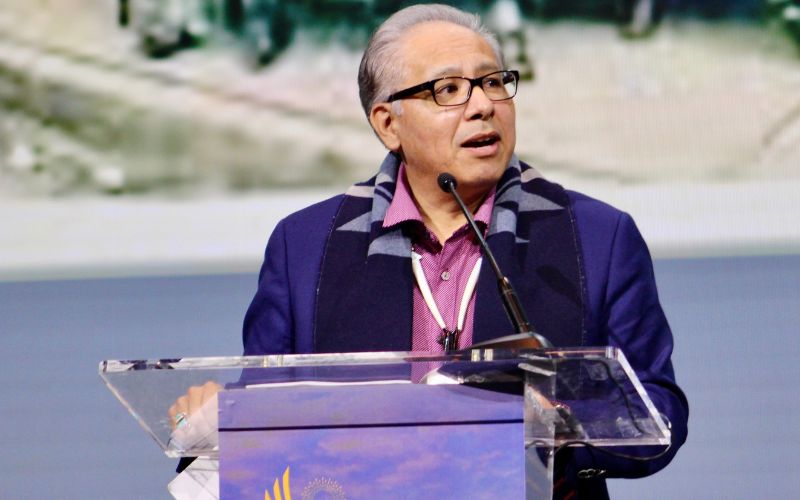
- Details
- By Levi Rickert
“Today marks a pivotal moment in our ongoing journey towards equity and empowerment for Tribal Nations,” Greg Masten (Yurok), President of the newly formed NCAI Foundation, said on Wednesday. “The NCAIF is not just a foundation; it’s a beacon of hope and a testament to our unwavering commitment to uphold tribal sovereignty, empower our leaders, and build a resilient future for our youth and our Nations. Through the NCAIF, we are forging true partnerships between tribal nations and philanthropy. We are dedicated to creating a future where tribal nations thrive, supported by the resources and recognition they rightfully deserve.”
In an interview with Native News Online, Masten and NCAIF vice president of philanthropic strategies Dawn Knickerbocker (White Earth Band of Ojibwe) said the new foundation will create more long-term sustainability for NCAI as well as expand on the original founding principles of NCAI to create more equitable ways to support Indian Country.
NCAI Executive Director Larry Wright, Jr. (Ponca Tribe of Nebraska) says the NCAI Foundation is part of the new era for the largest national Native American organization in the country.
“As we stand at the threshold of a new era with the launch of the NCAI Foundation, I am reminded of the profound responsibility we carry as stewards of our communities’ future,” Wright said. “Our leadership is charting a strategic course for the organization and the NCAI Foundation that is a journey of both honor and duty.”
The NCAIF 's mission is multifaceted, focusing on four core areas:
- Upholding Tribal Sovereignty
- Empowering Tribal Leadership
- Cultivating Youth Leadership
- Fortifying Tribal Nations
By offering grant funding under the Fortifying Tribal Nations program, NCAIF aims to be a catalyst for change, providing more than just financial resources but also serving as a pivotal connecting point for tribal nations and the philanthropic sector.
Masten cited the historic lack of philanthropic funding distributed to American Indians and Alaska Natives. Despite Native Americans representing nearly three percent of the U.S. population, they have historically received less than 0.5 percent of philanthropic dollars for their strategies or initiatives.
NCAIF seeks to address this disparity by ensuring more resources are directed toward supporting Tribal communities in diverse areas.
A cornerstone of NCAIF’s approach is the innovative Equity and Sovereignty Framework. This framework guides the foundation’s grantmaking processes, ensuring they are deeply rooted in principles of equity and respect for tribal sovereignty. The framework will also inform NCAIF’s approach to addressing the philanthropy sector’s interaction with Tribal Nations, emphasizing collaboration, respect for Tribal governance, and promoting culturally appropriate practices. It’s a significant step toward rectifying historical imbalances and fostering true partnerships between philanthropic entities and Tribal Nations.
“The Equity and Sovereignty Framework is more than just a policy tool; it is a commitment to Tribal Nations that every decision we make, and every partnership we forge will be done with the utmost respect for our sovereignty and with an unwavering focus on equity,” Wright said. “This is our pledge to create a lasting impact that honors the past while building a resilient and prosperous future for tribal communities.”
Traditional Philanthropy vs. Equity & Sovereignty Framework
Traditional philanthropy often operates with a top-down approach, where donors decide what is best for beneficiaries, which can unintentionally perpetuate systemic inequities. NCAIF incorporates three tenants to elevate Tribal Nations as equal partners in the philanthropic process.
These include:
- Shared Ownership to ensure that Tribal Nations are active participants in decision-making, creating solutions that are rooted in their lived experiences.
- Cultural Respect and Integration centering Native wisdom and sovereignty.
- Long-term Solutions to bring about sustainable, regenerative change driven by the unique needs and aspirations of each Tribal Nation.
The foundation will soon announce various opportunities for Tribal Nations to apply for grant funding. These initiatives will be based on the priorities identified by Tribal leaders and representatives in recent dialogues, emphasizing areas such as education, infrastructure, cultural preservation, economic development, environmental, and social inequities.
Help us ensure that the celebration of Native Heritage never stops by donating here.
More Stories Like This
Native News Weekly (August 25, 2024): D.C. BriefsNative News Weekly (March 1, 2026): D.C. Briefs
Scope Narrowed, Report Withheld: Questions Mount Over Michigan Boarding School Study
Zuni Youth Enrichment Project Announces Family Engagement Night and Spring Break Youth Programming
Next on Native Bidaské: Leonard Peltier Reflects on His First Year After Prison
Help us defend tribal sovereignty.
At Native News Online, our mission is rooted in telling the stories that strengthen sovereignty and uplift Indigenous voices — not just at year’s end, but every single day.
Because of your generosity last year, we were able to keep our reporters on the ground in tribal communities, at national gatherings and in the halls of Congress — covering the issues that matter most to Indian Country: sovereignty, culture, education, health and economic opportunity.
That support sustained us through a tough year in 2025. Now, as we look to the year ahead, we need your help right now to ensure warrior journalism remains strong — reporting that defends tribal sovereignty, amplifies Native truth, and holds power accountable.
 The stakes couldn't be higher. Your support keeps Native voices heard, Native stories told and Native sovereignty defended.
The stakes couldn't be higher. Your support keeps Native voices heard, Native stories told and Native sovereignty defended.
Stand with Warrior Journalism today.
Levi Rickert (Potawatomi), Editor & Publisher


